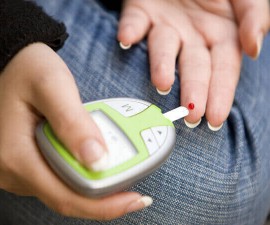Gestational diabetes is a unique type of diabetes mellitus since it is only found during pregnancy. But although it doesn’t affect all pregnancies, it seems that the number of cases is increasing. The good news, it can be managed. Even lifestyle measures are usually enough to cope with. But can it go away before delivery?
How does it occur?
Experts don’t know why some pregnant women experience gestational diabetes, while others don’t. The exact cause of the problem is also not fully known. But the elevated levels of pregnancy hormones – especially in the late stages of pregnancy – made and released by the placenta are often to blame.
Insulin is essential hormone released by the pancreas. It plays a key role to help regulate and reduce the high amounts of glucose (sugar) in the circulation (bloodstream). If there something goes awry with it, the natural mechanism of your body to regulate your normal blood sugar level is also affected.
In diabetes, the pancreas cannot make adequate insulin that the body needs –or– the body cannot use insulin effectively even though there is adequate insulin released by the pancreas. This usually occurs in type-2 diabetes, the most common type of diabetes mellitus.
In the worst scenario such as in type-1 diabetes, the pancreas is very poor in making insulin or sometime it cannot make insulin at all. Therefore type-1 is also often called as ‘insulin-dependent diabetes’, because patients usually need to take insulin every day to help control their blood sugar levels.
As the baby develops and grows, the mother’s body should make more insulin to keep the blood sugar at normal levels. Even in the late of pregnancy, the amount of insulin required can be 2-3 times greater than usual.
While the exact cause remains puzzling, experts believe that the chance of developing the condition is greater in pregnant women with the following risk factors:
- Age, becoming pregnant at the age of 30 or older. Even some experts think that age greater than 25 may affect the risk, too.
- A family history of diabetes, especially such as type-2 diabetes.
- Having the same condition in the previous pregnancy.
- Having a previous large baby at birth (greater than 9 pounds).
- Overweight and obesity before pregnant. Weight loss diet during pregnancy is usually not recommended! If you do concern about your risk of the condition and you’re trying to get pregnant, losing your excessive weight beforehand is your best option!
- Having had particular condition such as polycystic ovarian syndrome and previous complicated pregnancy.
- Taking particular medications may also have an effect, such as steroid and antipsychotic medications.
Can you get gestational diabetes in the first trimester?
The screening for gestational diabetes should be a part of your prenatal care appointment. It usually includes a pathology test, taking a blood sample before and after a glucose drink. It can help reveal whether your blood sugar level is safe or normal for your pregnancy.
If your doctor believes that you may have gestational diabetes, he /she may also ask you take POGTT (pregnancy oral glucose tolerance test). This requires taking a blood test in the morning or after fasting overnight. Then you’re asked to have a glucose drink, and take a blood test 1-2 hours afterwards.
Since the way of the condition to develop is closely associated with the amounts of hormones released by placenta, typically it occurs in the late stages of pregnancy. In other words, it usually doesn’t come up until later in pregnancy, when pregnancy hormones have been strong enough to interfere with the mother’s insulin. The screening is usually recommended between weeks 24 to 28 of pregnancy.
Although gestational diabetes is commonly diagnosed late in pregnancy, sometimes it can occur earlier. Even in a few cases, it can also be found too early such as in the first trimester. If you’re at high risk or have many risk factors of the condition, your doctor may ask you to take the screening earlier or even during the first visit after you get pregnant.
Can gestational diabetes go away before delivery?
Being diagnosed with this diabetes is not the end of everything. Many women with the condition are still able to have normal pregnancy and deliver healthy baby. There should be nothing to worry as long as you follow the treatment plan as directed.
However for some women, it’s not always easy to skip worrying about the health risks coming from gestational diabetes. One of frequently asked questions, can it go away during pregnancy or before delivery?




